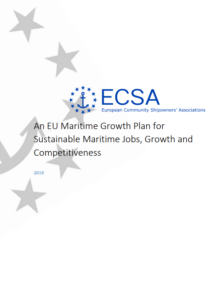ECSA launched an ambitious Maritime Growth plan for “Sustainable Maritime Jobs, Growth and Competitiveness”, aiming to ensure a thriving EU shipping industry, a strong skills base and the development of a world-class maritime cluster.
The Maritime Growth Plan, launched at an event on 29 October in Brussels, is expected to act as a strategic framework providing a holistic and common EU vision for actions to be taken at EU, national and local levels.
Shipping directly employs over 640,000 workers at sea and on shore, and supports over 1.4 million workers through indirect and induced employment. But if Europe is to retain its pre-eminence in global shipping, the know-how of these workers needs to be cherished and cultivated.
The sector is therefore in need to attract a sufficient number of quality new entrants and retain experienced seafarers, including women seafarers and other under-represented groups.
European shipping and the broader maritime sector are strategically important for the EU – in terms of its contributions to trade, geopolitical role and as an important source of employment. With this in mind, it is high time to have a jobs and growth strategy that recognises the strategic importance of Europe’s maritime know-how. Through this plan, European shipowners stand committed to take forward the objectives of ‘developing an attractive, smart, safe, social and sustainable quality shipping’ and a ‘world-class maritime cluster’, identified by Member States for the EU’s maritime transport policy,
…said Martin Dorsman, ECSA Secretary General.
As other major shipping centres around the world gain ground with intensive support from their governments, preserving and improving the existing policy framework is essential to keeping the EU shipping industry competitive.
Objectives:
- Enhance the social sustainability of shipping –‘to maintain and further develop attractive and smart, safe, social and sustainable quality shipping3 ’
- Promote the training, competitiveness and employment of EU seafarers § Enhance the skill base of EU seafarers § Enhance the growth and competitiveness of the EU fleet
- Deal with demographic developments § Ensure a sufficient supply of competent staff for the European maritime clusters with the right mix of skills and competencies – ‘World-class maritime cluster ’
Problem definitions:
- in order for the maritime industries in Europe to recruit and retain the required quantities and qualities of people and stay competitive in changing times with technological and environmental developments, it will be imperative to find ways to attract more people to careers in the maritime sector, with a particular focus on under-represented groups, including women
- business-as-usual is not an option if the industry is going to reinforce its workforce and attract younger people of this generation
- employment prospects for EU nationals in the maritime industries are closely linked to the strength, competitiveness and prosperity of the EU maritime industry in its entirety
The work is to be undertaken on 2 levels:
- EU level by ECSA and its members supported by EU funds/ EU institutions
- National, local and transnational level by ECSA members, ideally in association with national trade unions, national authorities and Maritime Educational Training providers (METs).
ECSA intends to seek support from its European social partner for joint campaign initiatives wherever practicable. The work will be divided into the following 4 areas:
- Raising the profile of the industry and the career opportunities it offers
- Increasing the attractiveness of EU Seafarers
- Measures to improve the future employment prospects of EU seafarers
- Improving the availability of statistics.
ECSA calls upon all actors in the sector, at EU, national and local levels, to join forces to reach these objectives and achieve meaningful and viable solutions without compromising the competitiveness of the sector,
…added Mr. Dorsman.
Explore more herebelow:


































































